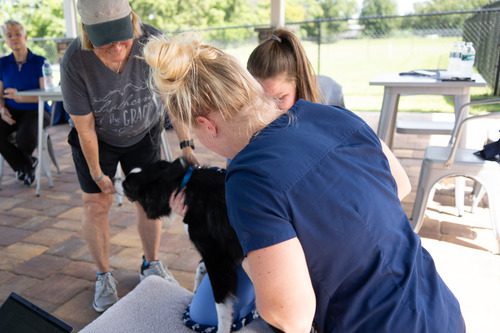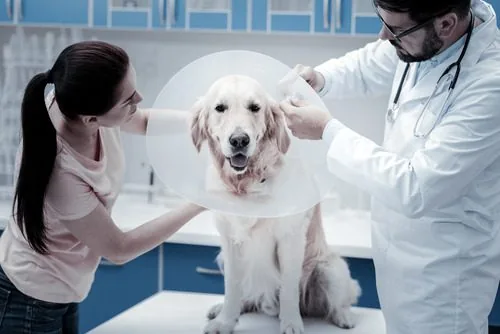Lameness in Dogs: Treatment Options
Experiencing lameness in your beloved dog can be a worrying sight for any pet owner. It’s essential to understand the various causes and treatment options available to ensure your dog receives the best care. At Veterinary Healthcare Associates in Winter Haven, FL, our dedicated team is here to guide you through understanding and addressing your dog’s lameness. Remember, while this article provides information, it’s always best to consult with our veterinary professionals for personalized advice. For more information or to schedule an appointment, call us at (863) 324-3340.

Understanding Lameness in Dogs
Lameness in dogs can be a concerning symptom for any pet owner. It often indicates discomfort or pain in one or more of your dog’s limbs. At Veterinary Healthcare Associates in Winter Haven, FL, we understand how distressing this can be. Lameness can stem from various causes, ranging from minor sprains to more serious conditions like arthritis or hip dysplasia. Early detection and professional evaluation are vital in determining the cause and planning an effective treatment strategy.
Common Causes of Lameness
- Joint diseases such as arthritis
- Injuries like sprains or fractures
- Developmental disorders, including hip or elbow dysplasia
- Neurological issues affecting coordination
Diagnostic Approach to Lameness
A thorough veterinary examination is crucial to diagnose the root cause of lameness. At Veterinary Healthcare Associates, our experienced team uses state-of-the-art diagnostic tools. This might include physical exams, X-rays, or even advanced imaging techniques like MRI or CT scans. Understanding the underlying cause is essential for effective treatment and your dog’s swift recovery.
What to Expect During the Diagnostic Process
Following a comprehensive physical exam, we often rely on imaging tests like X-rays to obtain a clearer picture of your dog’s skeletal structure. X-rays are particularly useful for detecting fractures, joint abnormalities, or signs of arthritis. In some cases, more advanced imaging techniques such as MRI (Magnetic Resonance Imaging) or CT (Computed Tomography) scans might be recommended. These methods provide detailed images of your dog’s bones and the surrounding soft tissues, including muscles, ligaments, and tendons, offering deeper insights, especially in complex cases. Additionally, our veterinarians might suggest lab tests, including blood work or fluid analysis, to rule out or confirm a diagnosis.
Throughout the diagnostic process, our team at Veterinary Healthcare Associates ensures that your dog is as comfortable as possible. We understand that this can be a stressful time for both you and your pet, and we strive to provide a calm, reassuring environment. Our goal is to determine the cause of your dog’s lameness accurately and swiftly, so we can begin an effective treatment plan tailored to their specific needs.
Professional Treatment Options for Lameness
Based on the diagnosis, our team at Veterinary Healthcare Associates will develop a tailored treatment plan. Treatment may involve medication for pain relief and inflammation, dietary changes or supplements, physical therapy, or in some cases, surgery. Our commitment is to ensure your dog’s comfort and quick return to health, using the most advanced veterinary medical approaches available.
The Role of Rehabilitation in Recovery
Rehabilitation plays a vital role in the recovery from lameness. At Veterinary Healthcare Associates, we offer various rehabilitation services, including laser therapy, hydrotherapy, and guided exercise programs. These therapies are designed to strengthen muscles, improve flexibility, and accelerate healing, helping your dog regain mobility and quality of life.
Ongoing Care and Monitoring
Managing lameness in dogs is an ongoing process. Regular check-ups, consistent medication management, and adhering to a rehabilitation program are key. At Veterinary Healthcare Associates, we partner with you every step of the way, providing guidance and support to ensure your dog’s continued well-being.
When to Contact Veterinary Healthcare Associates
If you notice any signs of lameness in your dog, it’s important to act promptly. Early intervention can make a significant difference in the outcome. We invite you to reach out to our compassionate team at Veterinary Healthcare Associates in Winter Haven, FL, for expert care. Don’t hesitate to contact us at (863) 324-3340 for an appointment or more information. We’re committed to providing comprehensive care and support to ensure your dog’s health and happiness.
Recent Posts
Laparoscopic Spay vs Traditional Spay: What’s Best for Your Dog?
Laparoscopic Spay vs Traditional Spay: What’s Best for Your Dog? When comparing a laparoscopic spay vs traditional…
Laparoscopic Spay: Everything You Need to Know
Laparoscopic Spay: Everything You Need to Know Laparoscopic spay, also called a “minimally invasive spay,” is an…
When is Dog Diarrhea an Emergency?
When is Dog Diarrhea an Emergency? Dog owners know all too well that occasional digestive upset isn’t…
Is Cat Constipation an Emergency?
Is Cat Constipation an Emergency? Cats are often private about their habits, especially when it comes to…
Feline Emergencies: Warning Signs Your Cat is Crying for Help
Feline Emergencies: Warning Signs Your Cat is Crying for Help Cats have a reputation for being independent,…
About Veterinary Healthcare Associates
Veterinary Healthcare Associates in Winter Haven, FL, was established over 30 years ago as Maxwell Animal Clinic by Dr. John Maxwell. Maxwell Animal Clinic was a one-doctor general practice offering preventive care, dentistry, and standard surgical services to the community. As the years passed, Maxwell Animal Clinic evolved into a thriving 10-doctor general, specialty referral, and emergency veterinary practice.








